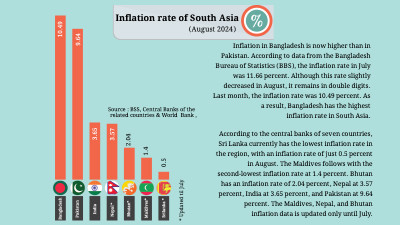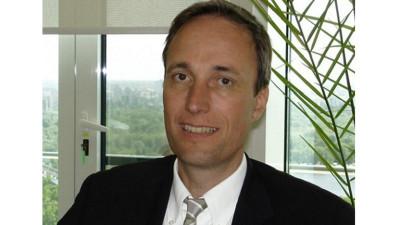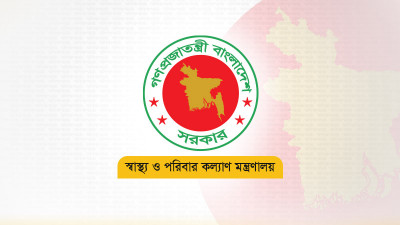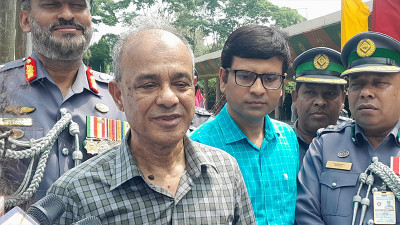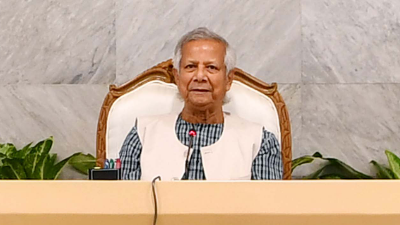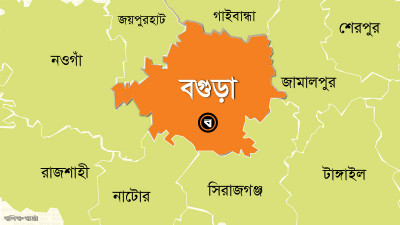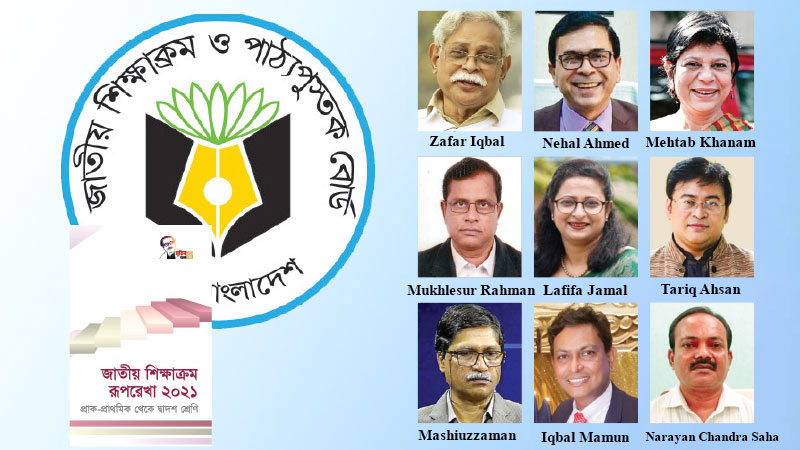 Photo: Bonik Barta
Photo: Bonik Barta Finland, a Scandinavian country, has a highly merit-based
and high-level training-dependent system for recruiting teachers at every
educational stage, from primary through higher education. Teachers' salaries
are also significantly higher. According to information from Finland's Ministry
of Education and Culture, the monthly minimum wage for a lower secondary school
teacher is approximately equivalent to 3,318 dollars in local currency, which
is about 28 times higher than a teacher's salary at the same level in
Bangladesh. Additionally, there are many more benefits. As a result, the
country's most talented individuals are often most interested in pursuing a
career in teaching.
The previous Awami League government in Bangladesh had
initiated a program to introduce an education curriculum modeled after
Finland's. However, the preconditions for effectively implementing this curriculum
were largely ignored. There were also complaints about the quality of the
textbooks prepared for the new curriculum. Despite significant expenditure on
teacher training, questions were raised about its effectiveness from the
outset. After various processes, the implementation of this curriculum began
last year. At that time, teachers, students, and parents started raising
questions about the new curriculum and the textbooks created for it. There were
allegations that the curriculum did not take the country's real context into
account and that the content of textbooks for lower secondary and secondary
levels was of poor quality. However, the government of the time claimed that
the new curriculum was designed based on the education systems of advanced
countries like Finland, the United States, and Japan.
The development of the new curriculum and the creation of
textbooks involved senior officials from agencies under the Ministry of
Education and educational experts. According to a notification from the
Ministry of Education, the National Curriculum Coordination Committee included
prominent educators such as Dr. Muhammed Zafar Iqbal, former professor at
Shahjalal University of Science and Technology; Dr. Amal Krishna Haldar,
professor in the Department of Mathematics at Dhaka University; Dr. Lafifa
Jamal, professor in the Department of Robotics and Mechatronics Engineering;
Dr. Mehtab Khanam, professor in the Department of Psychology; Dr. M Tariq
Ahsan, professor at the Institute of Education and Research (IER); Iqbal Rouf
Mamun, professor in the Department of Chemistry; Abul Momen, professor in the
Department of Mass Communication and Journalism at Chittagong University; and
Professor Nehal Ahmed, former Director General of the Directorate of Secondary
and Higher Education, among others. The heads or members of various relevant
institutions were also included in the committee by virtue of their positions.
Two chairpersons of the National Curriculum and Textbook
Board (NCTB), Narayan Chandra Saha and Forhadul Islam, as well as Curriculum
(Secondary) member Professor Dr. Mashiuzzaman and Curriculum (Primary) member
Professor Md. Mukhlesur Rahman played a crucial role in the development of this
curriculum. The research and pilot projects related to the curriculum were
essentially carried out under their supervision.
When asked about this, an NCTB official, speaking on
condition of anonymity, said, "The work related to the curriculum was
primarily managed directly under the Chairpersons and Dr. Mashiuzzaman. They
controlled how the textbooks would be developed and what changes would be made.
Additionally, Dr. Muhammad Zafar Iqbal and Dr. M. Tariq Ahsan played
significant roles in creating this curriculum."
The initiative to develop and implement a new curriculum
for primary and secondary education in the country began around 2017. Shortly
after the initiative was launched, the National Curriculum and Textbook Board
(NCTB) began research and survey activities related to the new curriculum.
However, there have been allegations that these research and survey activities
were conducted cursory from the beginning. Due to the failure to correctly
identify the challenges and weaknesses in implementing the new curriculum and
textbooks, various complaints emerged immediately after its launch. Following
the fall of the Awami League government on August 5 due to a student-led
uprising, the interim government decided not to implement this curriculum and
to revert to the 2012 curriculum. By then, several thousand crore Taka had already
been spent on the initiative.
Bangladesh is among the most backward countries in Asia
and even the world in terms of teachers' salaries in government schools at the
secondary level. Talented individuals show little interest in this profession,
and many of those who do enter teaching lack the necessary training.
There have been complaints that in 2023, the new
curriculum was implemented in the first, sixth, and seventh grades without any
teacher training. Although training was later arranged, there were significant
complaints about its quality. Teachers struggled to adapt to the new
curriculum, which impacted the classroom environment. Parents also complained
that students became overly reliant on Google while studying under the new
curriculum.
Additionally, there were allegations that the importance
of science education was diminished in the new curriculum. Previously, students
could choose between Business Studies, Humanities, or Science after passing the
ninth grade, but this option was not included in the new curriculum. Under the
new curriculum, all students must study a mandatory set of 10 general subjects.
As a result, where students used to have to take exams totaling at least 400
marks in subject-specific areas in secondary education, the number of marks
allocated to science subjects in the new curriculum was reduced to 100. At that
time, educators claimed that if everything were taught in an integrated manner,
students would not have enough time to learn each subject adequately. This,
they argued, could particularly lead to a further disinterest in science
education.
Analysis of several curricula reveals that, since 1990,
science has received the most minor emphasis at the secondary level in the
curriculum. In 1990, public exams for secondary education included 11 subjects
with a total of 1,000 marks. Of these, science subjects accounted for 300
marks, 30 percent of the total marks. By 2000, the SSC exams included 11
subjects with 1,100 marks, and science subjects were allocated 400 marks, making
up 36 percent of the total. In 2017, there were 14 subjects with 1,300 marks,
of which 400 marks were allocated to science, representing 31 percent of the
total. Under the new curriculum, for the 9th and 10th grades, there are 10
subjects, with science accounting for only 100 marks out of 1,000, which is
just 10 percent of the total marks in the secondary exams.
There were also questions about the quality of the
content in the textbooks provided for the new curriculum. The science books for
grades six through eight faced the most criticism. Among those responsible for
writing these books was Dr. Zafar Iqbal. There were allegations that a
significant portion of the content in these books was directly translated from
Google and even copied and pasted from various foreign blogs. Additionally,
there were accusations of including controversial topics in the seventh-grade
history and social science books.
Despite multiple attempts to contact the National
Curriculum Coordination Committee educators regarding this issue, it was
impossible to reach most of them. Professor Iqbal Rouf of the Department of
Chemistry at Dhaka University told Bonik Barta, "I was not involved in the
overall curriculum development. I was involved in a chapter related to food
security within the health protection subject. I believe this chapter is
important for students in the current context. However, there were indeed many
challenges in this curriculum. We have also discussed various issues, including
the lack of teacher training. However, I disagree with the sweeping statement
that it is unrealistic. The true nature of the curriculum would become apparent
after one or two years."
Meanwhile, although the curriculum has been canceled, BDT
has already spent several thousand crore on its implementation. Nearly BDT
10.29 billion was spent solely on teacher training over the past two years.
Although there have been questions about the quality of this training from the
beginning, a World Bank-funded project called "Learning Acceleration in Secondary
Education (LASE)" was also launched for teacher training, costing BDT
35.05 billion. Several other initiatives were also undertaken, including
creating a unique app named "Noipunno" and other related efforts.
Among the educators who have been vocal about the various
limitations of the new curriculum from the outset is Professor Dr. Tanzimuddin
Khan of the Department of International Relations at Dhaka University. He told
Bonik Barta, "There is a relationship between curriculum changes and
political economics in our country. This is because such changes often lead to
foreign loans and involve the printing of textbooks. In other words, there is a
financial opportunity for certain groups. As a result, these changes are
sometimes made without considering the overall context, so our education system
suffers."
He further stated, "Primary education is the
foundation of a country's education. However, the state of primary education in
our country is still precarious. If we want to improve our education system, we
must focus on two things. First, we need a clear goal on how we want to develop
our students, and second, we need to consider the real context of our country.
If we blindly follow the curricula of other countries without considering our
context, it will not be feasible in our country, and our objectives will not be
achieved."
Immediately after taking office, Professor Wahiduddin
Mahmud, the interim government's Ministry of Education advisor, commented that
the new curriculum was not feasible. He said, "In many cases, this new
curriculum is unsuitable for our country. Implementing the new curriculum with
our current teachers is very difficult, especially regarding the examination
and evaluation methods. Therefore, we will revert to the previous curriculum as
much as possible. However, this will be done in a way that does not cause any
discomfort to students who are currently following the new curriculum.
Revisions will be made accordingly. No decision will be made that might cause
students discomfort. The Ministry of Education has already issued instructions
and a circular regarding this matter."

